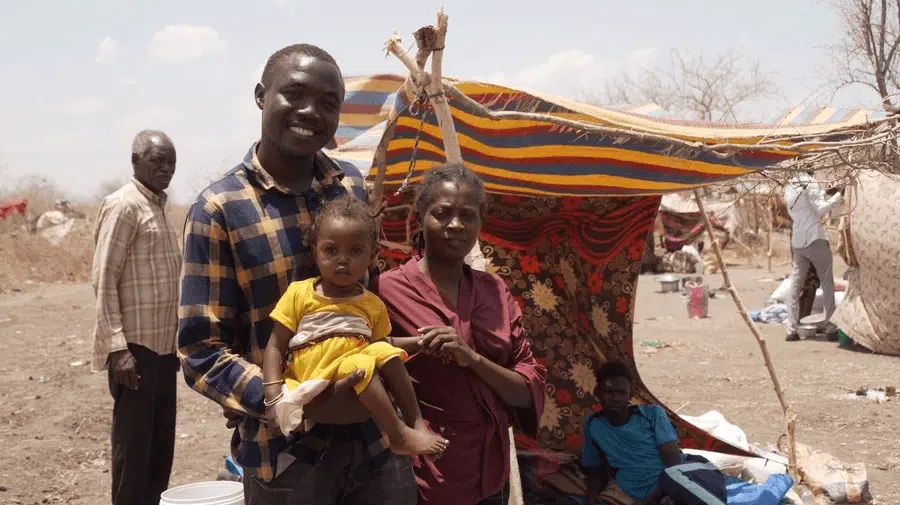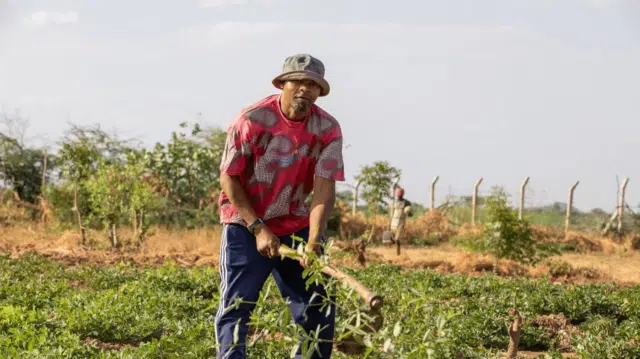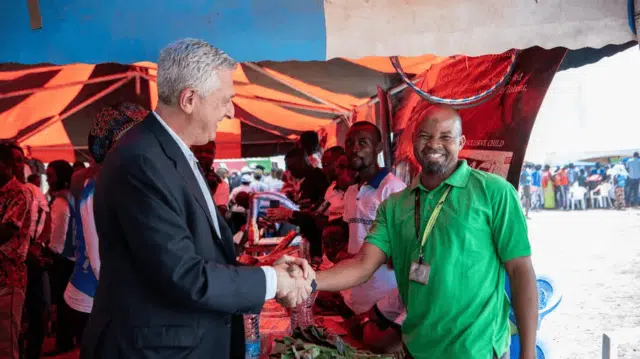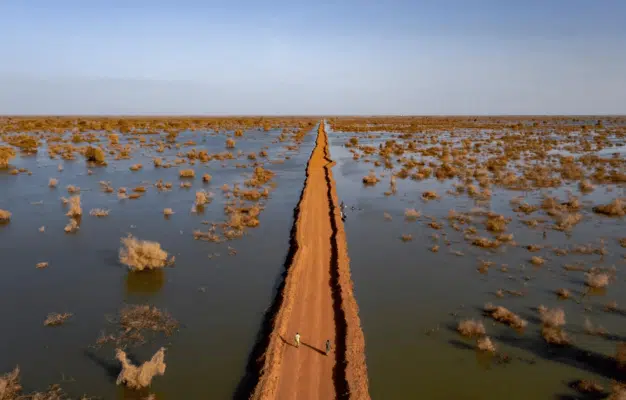
Ousman Abdallah fled the fighting in Khartoum to South Sudan with his four children and pregnant wife. © UNHCR/Melik Benkritly
Thousands of Sudanese refugees who arrived at UNHCR’s transit centre in Renk are being transported to refugee camps in Maban county in Upper Nile State.
By Melik Benkritly and Moulid Hujale in Renk, South Sudan | 27 June 2023
After three days in a transit centre in Renk County, in South Sudan’s Upper Nile State, Ousman Abdallah and his family, together with Eritrean refugees and asylum-seekers, are finally boarding a bus to Doro refugee camp in Maban County.
After three days in a transit centre in Renk County, in South Sudan’s Upper Nile State, Ousman Abdallah and his family, together with Eritrean refugees and asylum-seekers, are finally boarding a bus to Doro refugee camp in Maban County.
Ousman, 45, fled the conflict in Khartoum, Sudan’s capital, with his four children and pregnant wife. They are among over 6,800 Sudanese refugees who have crossed the border to seek safety in South Sudan since the fighting erupted in mid-April.
“The journey from Khartoum to the border was filled with a lot of hardships,” said Ousman, who worked as an electrician before the violence started. “It took us one week. We had a few beans which we were eating, as well as drinking water.
“When we came to Joda [the border crossing], there was a group of people who forcefully took possessions from people. I had two phones, one was faulty. They took the one that was working fine and left me the faulty one.”
The majority of those crossing the border are South Sudanese who had been living in Sudan as refugees before the conflict erupted. So far more than 117,000 have returned to the country they once fled, which was already grappling with severe food insecurity, inter-communal conflict, and the devastating impacts of climate change.
South Sudan was also hosting more than 300,000 refugees and asylum-seekers, mainly from Sudan, in addition to more than 2.2 million internally displaced people.
Dire situation made worse
After seven hours travelling on rough roads, the bus delivers Ousman and his family to Maban, which is home to over 168,000 refugees living in four different camps. Ousman’s family is settled in Doro, the largest of the four camps.
“Now we will go and make our little shelter, and we are hoping to receive blankets, water, and other materials,” he said.
The Sudan crisis is making an already dire humanitarian situation in Maban worse. Most of the refugees living there depend on humanitarian assistance, but lack of funding has forced the World Food Programme to cut food rations by 50 per cent over the past three years. Now, the disruption of cross-border trade caused by fighting in Sudan is pushing up food prices.
Walid Hakim, 48, a Sudanese refugee who serves as chairman of the Gandrassa refugee camp in Maban, said the economic situation in the camp had “completely deteriorated” since the start of the conflict in Sudan.
“The market has become expensive … people are just eating maize, there are no additional foods they are getting …. People have really suffered,” he said, adding that there was also a shortage of medicine even as people arrived at the camp with injuries incurred in Sudan.
As fighting between rival military factions continues in Sudan, aid agencies are bracing for more people to seek refuge in neighbouring South Sudan. UNHCR, the UN Refugee Agency, is working with the government to provide critical emergency assistance at the transit centre near the border, including water, hot meals, sanitation facilities, and primary healthcare.
As well as transporting Sudanese and other refugees to Maban, UNHCR is also working in collaboration with partners and local authorities to support South Sudanese returnees to travel to their respective communities.
However, the arrival of the rainy season poses a significant challenge. Already poor roads may be rendered impassable, further compounding the strain on an already underfunded and stretched humanitarian response in the country.
“One of the biggest challenges is flooding caused by climate change,” explained Jackline Alex Tillian, an assistant protection officer with UNHCR. “Where I am standing right now is a flood-prone area. When the flood comes, it affects the entire population, including the host community.”
“I hope the fighting will stop.”
Ousman said his main priority was having a safe place to live with his family.
“If Sudan becomes safe then we will go back. I hope the fighting will stop, fighting is not good because it is going to destroy people and displace [them] to different countries,” he said.
UNHCR recently launched an inter-agency funding appeal for $470.4 million to support over one million people, including refugees, returnees, and third-country nationals, affected by the Sudan crisis.
“We urgently request more resources and funding to meet the needs of the refugees and host community,” said Jackline. “We call upon all donors to please come and support these people. They need shelter, food, water, and health facilities.”
Originally published by UNHCR on 27 June 2023.





